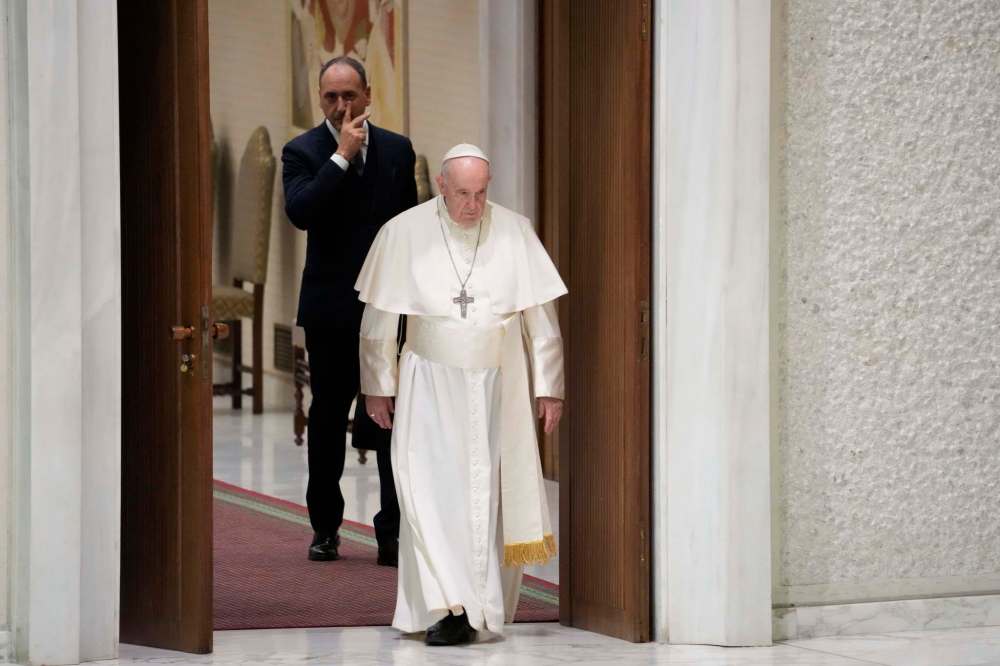‘Great expectations’ for meeting with Pope
Indigenous leaders to be in Rome next month
Advertisement
Read this article for free:
or
Already have an account? Log in here »
To continue reading, please subscribe:
Monthly Digital Subscription
$0 for the first 4 weeks*
- Enjoy unlimited reading on winnipegfreepress.com
- Read the E-Edition, our digital replica newspaper
- Access News Break, our award-winning app
- Play interactive puzzles
*No charge for 4 weeks then price increases to the regular rate of $19.00 plus GST every four weeks. Offer available to new and qualified returning subscribers only. Cancel any time.
Monthly Digital Subscription
$4.75/week*
- Enjoy unlimited reading on winnipegfreepress.com
- Read the E-Edition, our digital replica newspaper
- Access News Break, our award-winning app
- Play interactive puzzles
*Billed as $19 plus GST every four weeks. Cancel any time.
To continue reading, please subscribe:
Add Free Press access to your Brandon Sun subscription for only an additional
$1 for the first 4 weeks*
*Your next subscription payment will increase by $1.00 and you will be charged $16.99 plus GST for four weeks. After four weeks, your payment will increase to $23.99 plus GST every four weeks.
Read unlimited articles for free today:
or
Already have an account? Log in here »
Hey there, time traveller!
This article was published 25/11/2021 (1480 days ago), so information in it may no longer be current.
Phil Fontaine’s trip to Rome to meet Pope Francis next month will be in stark contrast to his first visit to the Vatican in 2009, when he was national chief of the Assembly of First Nations.
“We were unsuccessful in securing an apology” from Pope Benedict XVI, said Fontaine, although he noted the Pope did express “deep regret.”
The circumstances of the Dec. 14 to 21 visit “are so different,” said Fontaine, a member of the Sagkeeng First Nation in Manitoba.

In 2009, there had been no Truth and Reconciliation Commission report, nor had the unmarked graves of children who died at residential schools been discovered.
Now, he said, “we already know the Pope is committed to visiting Canada,” adding he hopes “the Holy Father will issue an apology” when he is here.
Fontaine spoke at a news conference hosted by the Assembly of First Nations Thursday. He has been named Manitoba’s delegate, and co-lead, for the Dec. 20 visit by First Nations leaders with the Pope.
Thirteen First Nations members from across Canada will make the trip, which is being organized and paid for by the Canadian Conference of Catholic Bishops. In addition, delegates from the Inuit Tapiriit Kanatami and the Métis National Council will attend. Each group will have one hour with the Pope.
Fontaine noted it has been a long journey for him and other Indigenous people.
“We are going to Rome with great expectations,” he said, noting he hopes the Pope will agree to issue an apology on Indigenous territory in Canada.
While an apology is important, Fontaine added the delegation is also focused on reparations, access to residential school records, continued searching for unmarked graves and practical efforts at reconciliation with Catholics in Canada.
“There are a number of issues,” on the table, he said, noting they can’t all be covered in the short time the delegation will meet with the Pope.
Norman Yakeleya, a regional chief from the Northwest Territories, who will be the delegation lead, said the visit “has been a long time in coming.”
It will provide “a measure of dignity and respect” to survivors and their descendants, he said, adding an apology is “absolutely required to advance reconciliation and healing.”
It is also important that such an apology take place “on our lands,” he said.
Although no locations for the papal visit have been announced, it was suggested the former residential school in Kamloops, B.C., where the first unmarked graves were found, might be an ideal place for him to visit.
“We are ground zero,” said Kúkpi7 Chief Rosanne Casimir of the Tk’emlúps te Secwépemc First Nation and the B.C. representative on the delegation. “It would be extra significant for him (the Pope) to visit this area.”
No date has been set for the papal visit, although it was speculated that Sept. 30, 2022, the second National Day for Truth and Reconciliation, would be appropriate.
Rosalie LaBillois of Eel River Bar First Nation in New Brunswick, a young person and inter-generational survivor, said the visit is especially meaningful since she will get to “do what my grandfather never got to do — speak his truth.”
To the best of her ability, LaBillois wants to “represent the youth perspective,” to the Pope, and come home with a message that Indigenous youth can be “proud of where we come from… we have a voice.”
faith@freepress.mb.ca
The Free Press is committed to covering faith in Manitoba. If you appreciate that coverage, help us do more! Your contribution of $10, $25 or more will allow us to deepen our reporting about faith in the province. Thanks! BECOME A FAITH JOURNALISM SUPPORTER

John Longhurst has been writing for Winnipeg's faith pages since 2003. He also writes for Religion News Service in the U.S., and blogs about the media, marketing and communications at Making the News.
Our newsroom depends on a growing audience of readers to power our journalism. If you are not a paid reader, please consider becoming a subscriber.
Our newsroom depends on its audience of readers to power our journalism. Thank you for your support.
The Free Press acknowledges the financial support it receives from members of the city’s faith community, which makes our coverage of religion possible.



